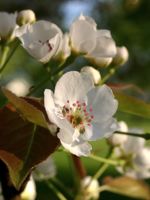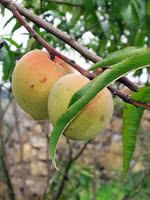Mon-Fri 9am - 5pm Mountain time
Ussurian Pear (Siberian) vs Siberian C Peach
Pyrus ussuriensis
Prunus persica Siberian C
NOT AVAILABLE THIS SEASON - MIGHT RETURN
NOT AVAILABLE THIS SEASON - MIGHT RETURN
Ussurian Pear is the most cold hardy of all pear species. It is frequently used as a rootstock or as a pollinizer for other pear varieties. The pinkish-white flowers that bloom in the spring and the striking fall colours make it well-suited as an ornamental addition to your landscape.
Ussurian Pear can also be used for forming hedges as it tends to branch quite low.
While the Ussurian Pear is considered self-pollinating, planting with another pear variety will increase yields. Can be paired with Krazulya Pear or Beedle Pear.
The Siberian C Peach is a cold hardy peach cultivar, and the fruit is great for producing juice and fresh eating. This variety is native to the Gobi desert area of China, and is relatively true to seed. In colder climates they might not grow fruit reliably as they require a relatively hot summer for the fruit to produce.
Unlike most peach trees the Siberian C Peach doesn’t require thinning and is quite productive. The fruit are firm enough to handle mechanical harvesting.
While it is possible to graft other peach varieties to the Siberian C Peach, research has shown that the Chui Lum Tao Peach and Tzim Pee Tao Peach are better candidates for rootstock.

